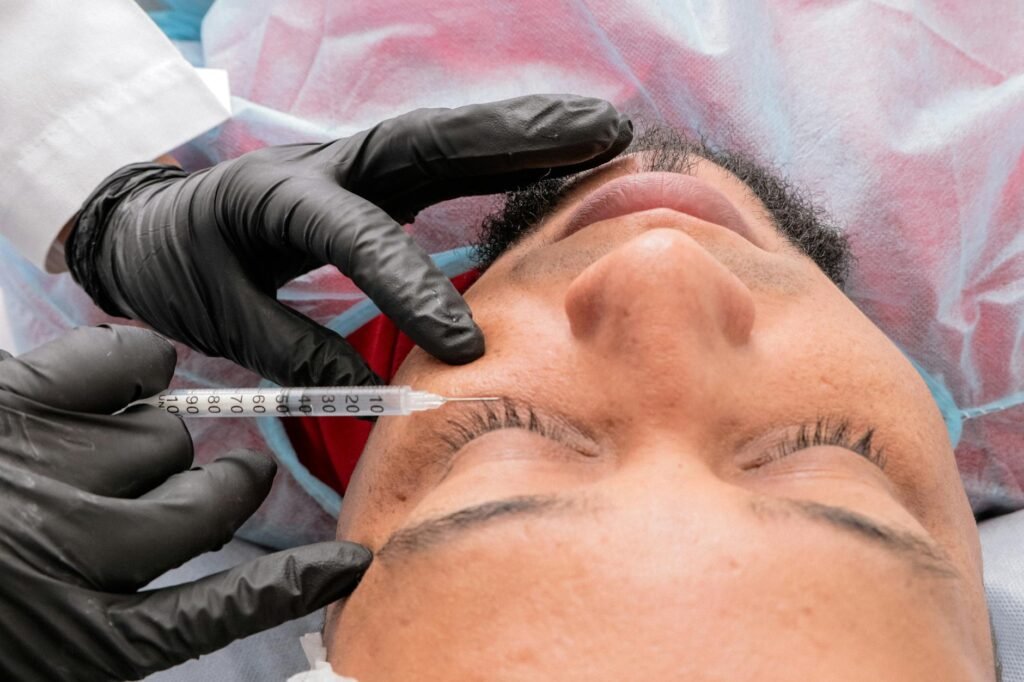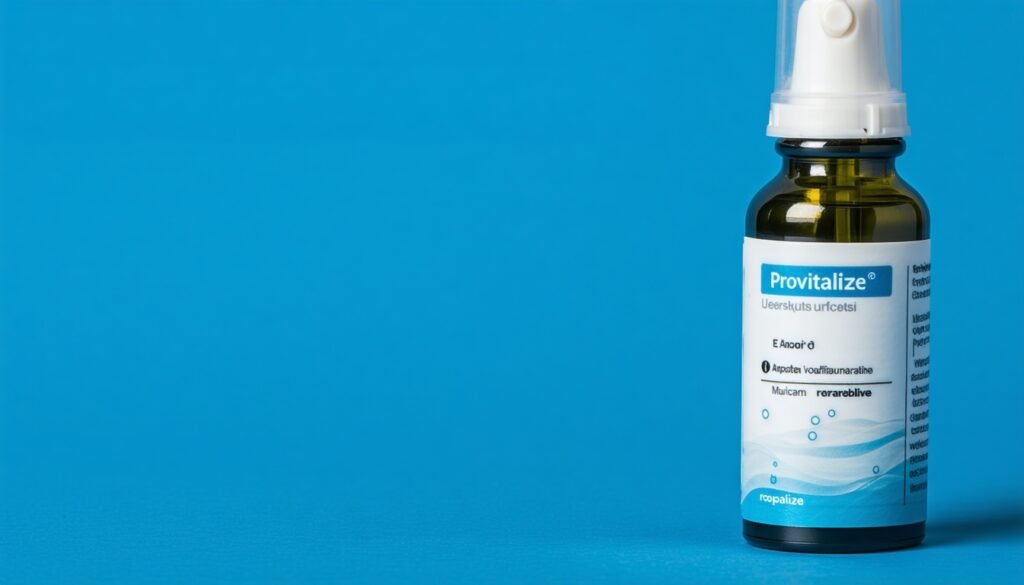Understanding Melatonin
Role of Melatonin in Sleep
Melatonin, the so-called “sleep hormone,” is like your body’s natural bedtime whisperer. It doesn’t knock you out cold but sets the stage for a peaceful drift into dreamland as its levels rise in the evening. Think of it as your internal lullaby, helping you ease into sleep. When the sun goes down, melatonin steps up its game, making your sleep quality top-notch.
This hormone is the maestro of your sleep-wake cycle and circadian rhythm. The pineal gland, a tiny conductor in your brain, cranks out melatonin at night and dials it down during the day. It’s all about syncing up with the light and dark show outside.
Melatonin Production and Release
Melatonin production is a backstage process in the pineal gland, a little gland in your noggin. It’s like a light switch—daylight keeps melatonin on the down low, but when night falls, the gland starts pumping it out, telling your body it’s snooze time.
| Time of Day | Melatonin Levels |
|---|---|
| Daytime | Low |
| Evening | Rising |
| Nighttime | High |
This hormone isn’t just about catching Z’s; it also keeps your body’s internal clock. Sometimes, folks need a little extra melatonin boost, like when dealing with delayed sleep-wake phase disorder (DSWPD) or non-24-hour sleep-wake disorder. But before you start popping melatonin pills, have a chat with your healthcare provider. You want to avoid any funky side effects or dodgy products.
Curious about melatonin’s safety and side effects? Check out our article on melatonin side effects. And if you’re battling jet lag, we’ve got a guide on melatonin for jet lag that’ll help you get back on track.
Benefits of Melatonin
Melatonin’s like the sandman in a bottle, helping folks catch those elusive Zs. It’s a hormone that keeps your sleep schedule in check, and when life throws your sleep out whack, melatonin supplements can be your trusty sidekick. Explain how melatonin can help with sleep disorders, jet lag, and insomnia.
Melatonin for Sleep Disorders
Ever feel like your sleep schedule’s been hijacked? Melatonin’s got your back, especially for folks dealing with delayed sleep phase disorder or those with circadian rhythm issues, like people who are blind. These conditions can make you feel like you are living in a different time zone. Melatonin resets your internal clock, helping you snooze and wake up at more regular hours (Mayo Clinic).
| Sleep Disorder | How Melatonin Helps |
|---|---|
| Delayed Sleep Phase Disorder | Resets your sleep schedule |
| Circadian Rhythm Sleep Disorders | Encourages regular sleep patterns |
Melatonin for Jet Lag Relief
Jet lag’s the price you pay for globetrotting, leaving you feeling like a zombie. Symptoms include feeling wiped out, scatterbrained, and struggling to sleep. Melatonin can help you adjust to new time zones, smoothing the transition. The trick? Pop 1 to 3 milligrams a couple of hours before hitting the hay (Johns Hopkins Medicine).
| Jet Lag Symptom | How Melatonin Helps |
|---|---|
| Fatigue | Cuts down on tiredness |
| Sleep Disturbances | Boosts sleep quality |
| Difficulty Concentrating | Sharpens focus |
For more tips on beating jet lag with melatonin, check out our article on melatonin for jet lag.
Melatonin for Insomnia
Insomnia is like a bad roommate who won’t let you sleep. Whether tossing and turning, waking up too early, or just can’t catch a break, melatonin can help you drift off faster and sleep better. It’s convenient for those with delayed sleep phase syndrome, where bedtime feels stuck on fast forward.
| Insomnia Symptom | How Melatonin Helps |
|---|---|
| Difficulty Falling Asleep | Speeds up falling asleep |
| Poor Sleep Quality | Improves sleep quality |
| Early Morning Awakenings | Extends sleep time |
Melatonin’s generally safe for short-term use, and unlike some sleep meds, it won’t leave you feeling groggy or dependent. For more on how much to take, check out our guide on melatonin dosage for sleep.
You can decide if it’s the right fit for your nightly routine by getting the scoop on melatonin’s perks for sleep troubles. Curious about side effects? Swing by our article on melatonin side effects.
Safety and Side Effects
Are you thinking about using melatonin for anxiety or other reasons? It’s good to know what you’re getting into. While melatonin is usually safe, being clued up on the possible side effects can help you make wise choices.
Common Side Effects of Melatonin
Most folks don’t have any trouble with melatonin when they stick to the recommended dose. But, some might notice a few mild side effects. According to the NHS, the usual suspects are:
- Dizziness
- Headache
- Nausea
If you start feeling dizzy, it’s best to take a break and sit or lie down until it passes. If you’re feeling woozy, steer clear of driving, biking, or handling tools, and skip the booze since it can make things worse. If the dizziness hangs around for a few days, it’s a good idea to stop taking melatonin and chat with your doctor.
| Common Side Effects | Frequency |
|---|---|
| Dizziness | Common |
| Headache | Common |
| Nausea | Common |
Serious Side Effects and Precautions
Serious side effects are rare, like finding a needle in a haystack, but they happen in less than 1 in 1,000 people. Here’s what to watch out for:
- Feeling down or depressed
- Allergic reactions (anaphylaxis)
- Seizures
If you start feeling blue, it might be a sign of depression, so it’s worth talking to a doctor. In the rare event of a severe allergic reaction, get medical help immediately. Look for symptoms like a swollen, itchy, blistered, or peeling rash.
| Serious Side Effects | Frequency |
|---|---|
| Depression | Rare |
| Allergic Reactions (Anaphylaxis) | Rare |
| Seizures | Rare |
Melatonin can also interact badly with some prescription medications, such as blood pressure pills, blood thinners, and anything that makes you sleepy. So, checking in with your doctor before adding melatonin to your routine is wise.
For more scoops on melatonin side effects, click here to read our detailed guide on melatonin side effects. Curious about how melatonin might mess with your dreams? Check out our article on melatonin and dreams.
Melatonin for Anxiety
Efficacy of Melatonin for Anxiety
Melatonin, the sleep hormone, is gaining attention for its potential to ease anxiety. It’s not just about catching Z’s anymore. This little hormone has shown its calming skills in various clinical settings. Melatonin works its magic through specific receptors or by doing its own thing without them. Interestingly, there’s more melatonin in the brain’s fluid than in the blood, hinting that cutting down on light pollution might boost its natural anxiety-busting powers.
When it comes to surgery jitters, melatonin has been a star player. It can chill you out before and after surgery just as well as those heavy-duty meds like benzodiazepines but without the groggy aftermath (NCBI). So, if you’re looking to keep anxiety at bay without the usual side effects, melatonin might just be your new best friend.
Studies on Melatonin and Anxiety
Research has been digging into how melatonin stacks up against anxiety. A 2018 study found it outperformed oxazepam, a common anxiety drug, in helping folks undergoing heart surgery feel less anxious and sleep better (Medical News Today). This suggests melatonin could be a safer bet than traditional anxiety meds.
Another study showed melatonin supplements beat placebo pills and matched prescribed meds in calming anxiety. People taking melatonin after surgery reported feeling less anxious (Baptist Health).
| Study | Findings |
|---|---|
| 2018 Study on Heart Surgery Patients | Melatonin outshines oxazepam for anxiety and sleep |
| General Clinical Studies | Melatonin matches benzodiazepines for pre-surgery anxiety without the brain fog |
| Postoperative Anxiety Studies | Melatonin cuts anxiety, pain, and morphine use after surgery |
Melatonin has also been tested as a pre-surgery chill pill, a sidekick to anesthetics, a pain reliever, and to ward off post-surgery confusion. Studies show it can calm pre-surgery nerves just as well as the usual anxiety meds.
If you’re curious about trying melatonin, check out the common side effects and the best dosage for sleep. Knowing how melatonin can help with anxiety might just be the key to better mental health and peace of mind.
Dosage and Recommendations
Are you thinking about using melatonin to chill out your anxiety? Let’s talk about how much you should take and when to pop that pill for the best results. This section spills the beans on how much melatonin you should take and when.
Optimal Melatonin Dosage
Depending on what you’re dealing with, how much melatonin you need can be a guessing game. For anxiety, folks usually take between 3 to 10 milligrams right before hitting the sack. Going over 10 milligrams might not give you any extra chill vibes and could even bring on some unwanted side effects.
| Condition | Recommended Dosage |
|---|---|
| General Anxiety | 3 – 10 mg |
| Sleep Disorders | 1 – 3 mg |
| Jet Lag | 0.5 – 5 mg |
If you’re having trouble catching Z’s, doses from 0.1 to 10 milligrams about 1 to 2 hours before bedtime usually do the trick. Start small and see how it goes, and always check in with your doctor before making any changes.
Timing and Administration Guidelines
Timing is everything when it comes to melatonin. To get the most out of it, take 1 to 2 hours before snoozing (Johns Hopkins Medicine). This helps sync up with your body’s natural sleep cycle and prepares you for quality shut-eye.
If you’re dealing with jet lag, adjust your sleep schedule to match the new time zone. Taking melatonin two hours before your new bedtime can make the switch smoother (Johns Hopkins Medicine).
| Timing | Administration |
|---|---|
| General Use | 1 – 2 hours before bedtime |
| Jet Lag | 2 hours before desired bedtime in new time zone |
For those using melatonin to keep anxiety in check, sticking to the dosage and timing is key for staying safe and getting the best results. Always have a chat with your healthcare provider before starting any new supplement, especially if you’ve got other health stuff going on or are on meds.
Curious about the side effects of melatonin? Check out our article on melatonin side effects. Want to know how melatonin affects your sleep and dreams? Dive into melatonin and dreams. If you’re a traveler, our guide on melatonin for jet lag has more tips for handling time zone changes.
Melatonin and Health Conditions
Melatonin and Alzheimer’s Disease
Melatonin has been getting some attention for its possible perks in managing Alzheimer’s symptoms. Studies hint that it might ease evening confusion and restlessness for folks with Alzheimer’s, though it doesn’t seem to boost brain power (Mayo Clinic). This could be a lifesaver for caregivers trying to manage the behavioral quirks of Alzheimer’s patients.
| Symptom | Effect of Melatonin |
|---|---|
| Evening Confusion | Reduction |
| Restlessness | Reduction |
| Cognitive Function | No Improvement |
Curious about melatonin’s side effects? Swing by our page on melatonin side effects.
Melatonin and Neurodegeneration
Melatonin is buzzing about its neuroprotective mojo. It plays nice with female hormones, helping keep menstrual cycles in check and maybe even shielding against brain degeneration. Some studies on folks whose pineal glands were removed suggest melatonin might have some anti-aging tricks up its sleeve (Cleveland Clinic).
In animal tests and various clinical settings, melatonin has been shown to chill out anxiety, working through specific receptors or by doing its own thing. It’s found in higher amounts in cerebrospinal fluid than in blood, hinting that keeping melatonin levels up by cutting down on light pollution might be a natural way to protect the brain and ease anxiety.
| Condition | Potential Benefit of Melatonin |
|---|---|
| Neurodegeneration | Protection |
| Anxiety | Reduction |
| Aging | Anti-aging Properties |
Want to know how melatonin messes with your sleep? Check out our piece on melatonin and dreams.
Melatonin has also been shown to calm pre-op and post-op jitters in humans, working as well as benzodiazepines without messing with motor skills or brain function after anesthesia. It also cuts down on post-op pain, lowers morphine use, and helps you bounce back quicker with less excitement and sleep issues after surgery (NCBI).
Planning a trip and worried about sleep? Visit our page on melatonin for jet lag.
By learning about melatonin’s potential benefits for these health issues, people can make smart choices about adding it to their health game plan. For dosage tips, check out our guide on melatonin dosage for sleep.
Melatonin and Circadian Rhythm
Melatonin and Sleep-Wake Cycle
Melatonin, the “sleep hormone,” is like your body’s bedtime whisperer, nudging you toward dreamland. The pineal gland cranks up melatonin production at night, while daytime sees a drop (Cleveland Clinic). This hormone is the maestro of your body’s circadian rhythms, responding to the light and dark cues of the day.
| Time of Day | Melatonin Levels |
|---|---|
| Daytime | Low |
| Nighttime | High |
When darkness falls, melatonin steps up its game, helping you catch those Z’s. But it’s not the only player in the sleep game. Your sleep environment and overall health also have a say in how well you snooze.
Impact of Melatonin on Circadian Rhythms
Circadian rhythms are like your body’s internal clock, keeping everything on a 24-hour schedule. Melatonin is the conductor, ensuring your body’s functions happen at the right time. As evening approaches, melatonin levels rise, signaling it’s time to wind down and hit the hay.
Low melatonin levels, known as hypomelatoninemia, can throw your sleep schedule out of whack, leading to circadian rhythm sleep disorders. This can mess with your sleep quality and even affect your health. Causes can be direct, like issues with the pineal gland, or indirect, such as environmental factors or medications.
| Condition | Impact on Circadian Rhythm |
|---|---|
| Delayed Sleep-Wake Phase Disorder (DSWPD) | Trouble falling asleep and waking up at regular times |
| Non-24-Hour Sleep-Wake Disorder | Sleep-wake cycles that don’t match the 24-hour day |
Melatonin supplements can be a game-changer for folks dealing with sleep disorders like DSWPD and non-24-hour sleep-wake disorder. But before you start popping melatonin pills, it’s wise to chat with a healthcare provider. They can guide you on potential side effects, the correct dosage, and the quality of different products.
For more scoop on melatonin’s effects and safety, check out our articles on melatonin side effects and melatonin dosage for sleep. Plus, see how melatonin can help relieve jet lag and influence dreams.
Melatonin and Immune System
Melatonin’s Role in Immune Modulation
Melatonin isn’t just the sleep fairy; it’s also a bit of a superhero for your immune system. It can kick your immune response into gear when things are running smoothly and calm it down when it’s throwing a tantrum. This makes melatonin a handy tool for keeping your body’s defenses in check.
When it comes to inflammation, melatonin is like a peacekeeper. It lowers the production of those pesky pro-inflammatory cytokines, helping to keep inflammation from spiraling out of control and causing damage. This is especially important for folks dealing with autoimmune issues or chronic inflammation, where the immune system can act like it’s had too much caffeine.
| Function | Role of Melatonin |
|---|---|
| Immune Stimulation | Boosts immune response when needed |
| Anti-Inflammatory | Calms down excessive immune reactions |
Curious about what else melatonin might do? Check out our article on melatonin side effects.
Potential Benefits of COVID-19 Treatment
The COVID-19 pandemic has been a wild ride, and finding ways to tackle the virus and its nasty side effects is crucial. Melatonin, thanks to its ability to chill out inflammation, has popped up as a potential hero in the fight against COVID-19.
In COVID-19 cases, the immune system can go haywire, leading to what’s known as a cytokine storm—basically, a flood of inflammation that can wreak havoc on the body. Melatonin’s knack for calming the immune system and reducing inflammation makes it a promising option for easing these symptoms. By taming the cytokine storm, melatonin might help lessen the severity of the illness and boost recovery.
| Benefit | Role of Melatonin in COVID-19 |
|---|---|
| Inflammation Control | Tames cytokine storm and inflammation |
| Immune Modulation | Keeps immune response balanced to avoid damage |
Want to know more about how melatonin affects your sleep and dreams? Dive into our article on melatonin and dreams.
Melatonin’s talents go beyond just helping you catch some Z’s. It’s a valuable ally in managing your immune system and controlling inflammation. Whether you’re a health buff, a sleep-deprived zombie, or a science geek, getting the scoop on melatonin’s broader uses can help you make the most of this versatile hormone. For tips on how much melatonin to take for sleep, swing by our article on melatonin dosage.











